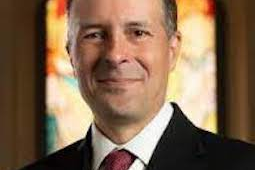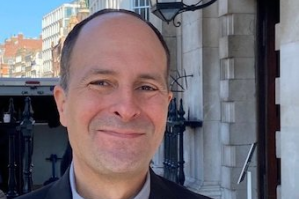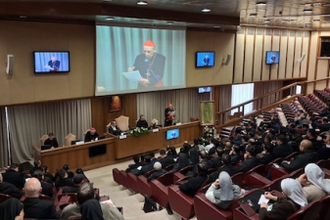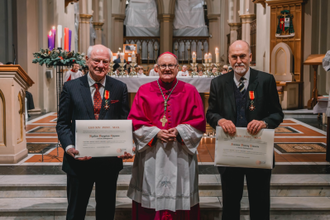Text: Marie Dennis at national service for Archbishop Oscar Romero

Marie Dennis
Marie Dennis is a Co-President of Pax Christi International and the co-author of two books about Romero. This is the text of a talk she delivered on Saturday at the annual national service to commemorate his assassination on 24 March 1980. It was held at St Martin in the Fields, Trafalgar Square, London.
Prophet of Peace Through Justice
Luke 4: 16-21 Good News to the Poor
In the coming days we will remember two powerful stories about death and resurrection – the story of Jesus from first century Palestine and the twentieth century story of Archbishop Oscar Romero from El Salvador. In many ways, they are the same story – one that helps us in 2013 know who we are, what we believe and how we are called to live.
Both are stories about torture and execution, painful subjects about which we know all too much in our own times -- but they are also stories about hope and good news, especially good news for impoverished, marginalized and brutalized people.
Luke’s account of Jesus’ inaugural address: He sent me to bring the good news to the poor … points directly toward that hope. Jesus’ way of life and mission had direction from the start. His was Good News about inclusive communities; just social structures; right relationships; and peace. And so he was killed.
Archbishop Romero’s mission was also one of hope, of Good News. He had encountered the Gospel in living color as he accompanied communities who were impoverished and brutally violated and he was evangelized by those experiences. In a reflection on Luke’s Gospel, Romero, two months before he was killed said, In the most sublime homily ever proclaimed, Christ closes the book and says: ‘Today these things have been fulfilled.’ This is the homily: the Word of God is not a reading of the past but a living Word, a Spirit that is being accomplished here and now.
A community from Morazan in El Salvador described their own encounter with the living Word of God:
Someone blows a few times on the coals that seemed dead and they begin to glow and the puff of breath brings the flame to the ocote [to the firewood]. That’s what happened in our lives. The breath came, and the wind brought us the light that broke the night. And our communities became a living church. The word of God came to us and poor people began to have faith in other poor people … Our finding the Bible was like an earthquake.
After that, Archbishop Romero arrived, who preached the word of God in the midst of oppression. His prophetic voice fanned the ocote. The red coals became fire … (from Renny Golden, The Hour of the Poor, the Hour of Women: Salvadoran Women Speak)
Remember the exceedingly violent context in which these communities and Archbishop Romero found themselves. Between 1975 and 1992, over 70,000 Salvadorans were killed in a brutal civil war; many of those killed were church workers who died for their commitment to the Gospel and liberation. Most were Salvadoran campesinos. The war in which they were killed was not a war about religion – at least not on the surface, but a war about land and political power, wealth and ideology. It was a war fueled by geopolitical interests as defined in the Cold War, with the United States playing a major role. To talk about Christ crucified in the 20th century in El Salvador is not an exaggeration.
Romero listened, really listened to the stories of the people, one after another, day after day and he held them sacred. He believed that each person’s life, each one’s history is his or her meeting place with God. The stories he heard were the foundation of his powerful homilies and the impetus for his prophetic witness.
Romero chose sides in an extremely complex, violent socio-political reality. But his commitment to nonviolence was impeccable. He positioned himself in a very narrow space where he could speak truth publicly and privately based on the stories he heard and the reality he witnessed day after day – where he could plead for an end to all the violence, for a peace that was (in his own words) not the silence of cemeteries (p.76), but shalom.
But the role of Archbishop Romero in El Salvador, the depth and character of his spirituality, the finesse of his public positioning and powerful witness make him an exceptional model for would-be disciples of Christ and perhaps especially for those of us whose commitment to nonviolence is constantly challenged by egregious attacks on vulnerable people and our planet.
To remember Romero is not just a nice thing to do. He had the audacious power to defy death. He absolutely believed in Resurrection and he constantly gave witness to that belief in the way he lived and the words he spoke. If they kill me, he said, I will rise again in the people of El Salvador. To remember Romero is to embrace the fullness of life.
Since the turn of the millennium just a few years ago, the world has been witness to violent conflict or brutal repression somewhere in the world without respite: Sudan, Colombia, Palestine, Iraq, Afghanistan, DR Congo, Mexico, Libya, Mali, Pakistan, Syria. We have witnessed the globalization of social injustice, with a growing gap between a very few who are extremely wealthy and a majority in almost every country who are increasingly poor. We have seen the emergence of a battlefield without borders where due process has given way to targeted assassinations. We see the earth threatened, perhaps irrevocably.
Romero risked stepping off the edge, into the unknown, believing with the great Brazilian educator, Paulo Freire, that Life is risk. If I do not risk, I cannot be. ( p. 77)
Archbishop Romero taught us to be in solidarity with those who are poor; to accompany people living precariously on the margins of life; to look at reality through their eyes; to embrace the risks of life that being connected to suffering and marginalized people will require.
Often, when I speak to young people starting out in life, I tell them not to play it safe and not to live virtually; to go to the margins, crossing borders into unfamiliar territory; to step into life, even if it feels a little dangerous; to rethink what we mean by security. I actually believe that is a challenge for all of us. The orchestration of fear and the response to orchestrated fear have become the primary occupation of too many people. That fear keeps people apart; encourages enemy-making; prevents many joyful, sorrowful, poignant encounters; isolates us from deeper relationships and meaningful experiences; and perpetuates war and violent conflict. I am increasingly convinced that such a willingness to risk – whatever that means in each of our lives – is essential to faithful discipleship. Life is risk. If I do not risk, I cannot be.
Romero repeatedly challenged the culture of death, that in which he was immediately immersed, but also its roots and expressions beyond El Salvador. His holding of life sacred was not rhetorical, but a daily creative task. What Romero resisted was death, the death of children ill from curable diseases, the death of hope in young people, the death of those who stood up to the gods of death – death from war, torture, poverty, cynicism or despair. In this way, Romero demonstrated his unequivocal belief in Resurrection. We are invited again – by the life and witness of this great saint of our times - to do the same.
For more information see: www.romerotrust.org.uk/


















